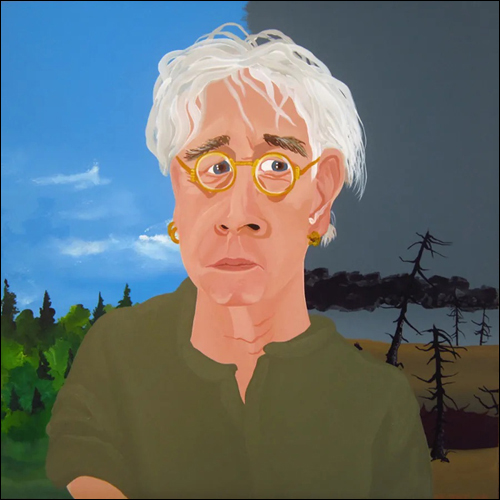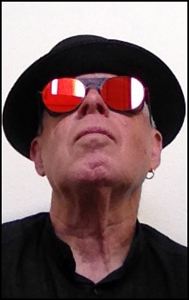May 3, 2013 – The date on the notebook page is April 11, 1983. Bruce Cockburn was in the midst of putting together songs for Stealing Fire, the politically charged album that would finally gain the Canadian musical icon recognition in the United States, lionized by the left and vilified by the right.
You can see that Cockburn returned to this page several times. The handwriting starts off in green ink, but there are edits in black and then blue. Scribbles and deletions criss-cross the page.
On the right-hand side is a hastily scrawled margin, encasing a list of more than 25 words. Each one rhymes with hate.
The page displays no title, but this where Cockburn’s If I Had a Rocket Launcher took shape — at least on paper, the inspiration for the controversial song came two months earlier during a visit to a Guatemalan refugee camp.
The words “shot down” are replaced by the more direct “murdered.” The name of Guatemalan dictator “Rios Montt” is simplified to “generals.”
Surprisingly, the phrase “that son of a bitch would pay” is lined out for “I’d make somebody pay.”
The stricken phrase eventually returns in Cockburn’s final edit to close the song with the chilling “some son of a bitch would die.”
The pocket-sized black book is one of 32 found in the Bruce Cockburn Collection, a new addition to the McMaster University Archives at Mills Memorial Library.
As well as the notebooks, the collection consists of correspondence, recordings, films, scrap books, awards, photos, T-shirts, hats and assorted memorabilia.
Cockburn has even parted with three of his prized guitars — a 12-string Guild, a Little Martin travel guitar, and a handcrafted Manzer with quotations by former Czech president Vaclav Havel and French philosopher Jean-François Lyotard written on its body in silver marker.
In all, the collection takes up 63 boxes of varying size. The carefully prepared catalogue, listing every item, takes up 64 pages.
The correspondence includes letters and acknowledgments from Oscar-winning actress Vanessa Redgrave, environmentalist David Suzuki, former cabinet ministers John Crosbie and Lloyd Axworthy, Grateful Dead guitarist Jerry Garcia, singer Anne Murray and former Governor General Adrienne Clarkson.
It’s the 32 notebooks, however, that form the collection’s core. They cover the years 1969 to 2002 and show how Cockburn’s songs took shape, the outpourings of a creative mind at work. Among the random thoughts and jottings are remnants of poetry, recipes, drawings and doodles, even reminders on how to make overseas phone calls.
“For years, I made a pretty religious practice of carrying around a notebook with me all the time because I found that if I got an idea and I didn’t write it down right away, it was gone,” Cockburn said in an interview Wednesday from his home in San Francisco, where he has recently settled with his wife, MJ, and 18-month-old daughter, Iona.
“It’s like dreams. You tell yourself you’re going to remember that dream, but if too many conversations go by before you get it in writing, you’re not going to remember it.”
Cockburn said McMaster officials first approached him about acquiring his collection in 2009 after the university presented him with an honorary doctorate.
“It’s something I hadn’t given a lot of thought to other than in a very general way. I had been saving all this stuff and at one point I figured I might try to see if somebody was interested in taking it over,” said Cockburn, 67.
“McMaster approached me and asked if I was interested … It’s a major university and they were interested. I figured they would treat it with respect.
“I gave them everything I had collected up until the year 2000, basically. I didn’t give them family photographs and things like that. It’s stuff that is related to my so-called career, however tangentially. There is quite a range of stuff but it all has something to do with my time in the music world.”
Cockburn is in good creative company. The McMaster Archives also house collections by British philosopher Bertrand Russell and authors Pierre Berton, Farley Mowat, Peter C. Newman and Margaret Laurence.
Musically, Cockburn’s papers sit alongside those of conductor Boris Brott, singer-songwriter Ian Thomas and the late Hamilton jazz/blues singer Jackie Washington. The largest collection, from Canadian publishing giant McClelland & Stewart, consists of more than 1,000 boxes.
McMaster archivist Rick Stapleton says the collection is open to members of the public who are interested in researching Cockburn’s career. Stapleton said he has already had expressions of interest from researchers, and two documents — a lyrics sheet and the text of a speech — are on loan to the Canadian War Museum in Ottawa for a special Peace exhibition.
The Cockburn collection will be officially unveiled at an invitation-only reception Tuesday evening at McMaster University’s Convocation Hall. Cockburn will be in attendance and will say a few words, but he has no plans to perform. But his friend, Hamilton singer-songwriter Tom Wilson, will be on hand to play some Cockburn favourites.
Cockburn plans to stay in Hamilton a couple of days after the reception to do some research in the McMaster archives. He’s working on a memoir he hopes to have completed by the end of the summer.
COCKBURN AND HIS GUITARS
Bruce Cockburn talks about the three guitars he has donated to the McMaster archives
Guild 12-string, model F212-NT, serial 51968, 1971
“That is on a couple of albums, You’ve Never Seen Everything (2003), for sure, and I think it’s on Breakfast at New Orleans, Dinner in Timbuktu (1999) … We had trouble amplifying that one for live shows. It didn’t come with a built-in pickup. I replaced it with a 12-string Manzer.”
Manzer, serial 10228
“This one is a Linda Manzer guitar. I hold her in great esteem as a luthier, and I’ve been very much associated with her for decades. I thought it would be good to have something of hers in there and I had enough of them that I could spare one.”
Martin & Co., Little Martin LX1E, serial MG 18964
“A Little Martin travel guitar that I took to Nepal with me. That guitar is in a documentary we made about that trip to Nepal (the film is also part of the collection) so I thought it would be nice to be able to see it on film and have it there.”
Credit: Bruce Cockburn donates his archives to McMaster by Graham Rockingham – thespec.com.
There is also an audio interview on the original site, follow the above link.
Bruce Cockburn donates archives to McMaster University
May 2, 2013 – McMaster University in Hamilton, Ont. announced Wednesday that Canadian songwriting legend Bruce Cockburn has donated his archives to McMaster — notebooks, musical arrangements, gold records, letters, scrapbooks, nearly 1,000 recordings and even three guitars.
The archive is there for students to pore over — and on Tuesday, Cockburn, 67, will be at McMaster to formally unveil the collection during a small, invite-only ceremony.
‘Sometimes the words are just sitting there waiting for the right music.’—Bruce Cockburn
“It’s nice to think there’s some vestige of what I did in there that’s preserved,” Cockburn told CBC Hamilton. “That said, I worry about inflicting it on some people. Some poor kid is going to have to study that stuff to get his PhD.”
All three guitars in the collection have been played live and popped up on various albums over the course of the Ottawa-born musician’s decades-long career. The Guild 12-string was a gift from a former girlfriend, and it’s the first 12-string guitar he ever owned.
The Martin is a travel guitar, and can be seen in the 2007 documentary Return to Nepal. And the Manzer is a custom build, constructed by Toronto-based luthier Linda Manzer.
But the jewels of the collection are Cockburn’s handwritten notebooks. Inside are drafts of some of his biggest songs — like Lovers in a Dangerous Time from 1984’s Stealing Fire. A Manzer guitar much like the one pictured here is part of the Bruce Cockburn collection that has been donated to McMaster University. (Aaron Harris/Canadian Press)
“There’s always a notebook,” Cockburn said. “I learned very early on that if you don’t write those things down, they’re gone.”
Lyrics are scrawled on now-faded pages in those notebooks — some lines crossed out, some changed as tunes evolved and took shape. There are sketches, notes from travel and first drafts of speeches.
In most cases, the lyrics almost always come before the music, Cockburn says. “Then I remember the music by playing it over and over.” But that doesn’t mean the songs come easy.
“Getting images into a poetic form that can be put to music sometimes takes some doing,” Cockburn said. “Sometimes the words are just sitting there waiting for the right music.”
There are also thousands of photos from countless performances in the collection, as well as tour memorabilia from over the years. One show poster is clearly from very early on — the cover price is $1.50.
Cockburn says he’s not usually one to give in to great waves of nostalgia. But it still means something to know people are this interested in his work — and committed to preserving it. It might not seem clear to everyone who reads it, he says, but years of work are summed up in those pages and have been played on those strings.
“There’s a definite personal history there.”
Credit: Bruce Cockburn donates archives to McMaster University by Adam Carter, CBC News. Visit this page for a glimpse at the archives – photo slide shows.
Related Posts:
Related Links:
- Slide show of some of the archive material.
- McMaster.ca Library Archives
- Video
- In photos: Bruce Cockburn donates archives to McMaster University by Brad Wheeler
- Video









